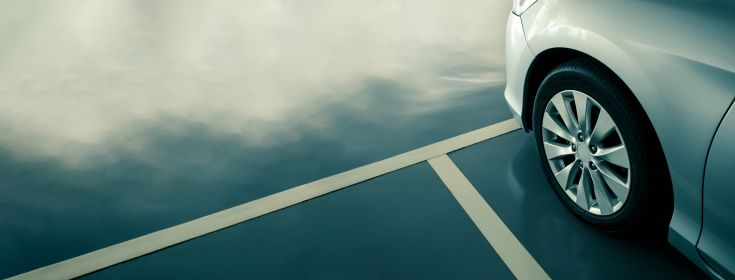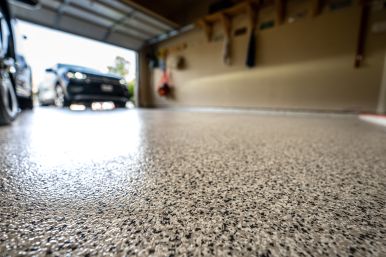Is it worth it to have an epoxy garage floor?
The average cost of garage floor epoxy installations ranges from $1,500 to $3,000, which may be prohibitive for some customers. Epoxy floors, on the other hand, are a long-term asset that will last for many years, making the time and money well spent.
Depending on a few key factors, epoxy mats and floor sealants are significant investments that can be quite expensive:
- The amount of epoxy coats are used
- The area of the garage
- Individual rates for the contractor
- Additional ornamental elements
- The garage’s state prior to application
How much does it cost to epoxy a 2 car garage near me?
For a two-car garage floor, a polymer composite concrete coating will cost somewhere around $1,320 and $3,080, with the majority of homeowners spending around $1,711 when professionally installed. The cost of coating an existing concrete floor, including labor and materials, varies from $3 to $7 per sq foot.
The price of epoxy flooring can range from $750 to $4,928, but most homeowners spend between $1,320 and $3,080 on both the installation and the materials. According to the type of epoxy being used labor costs, epoxy coating prices can vary from $3 to $7 per square foot. Epoxy that is 2 or 3 times less solid than water-based epoxy. The preferred option for durable flooring with minimal maintenance requirements is solid epoxy.
How long does an epoxy garage floor last?
Under heavy traffic, epoxy flooring usually lasts two to three years. This is something that rental buildings with a lot of everyday foot traffic, such as garages, eateries, or manufacturing facilities, can anticipate. Your epoxy flooring could last considerably longer, though, with the right care and upkeep.
Homeowners can anticipate keeping their epoxy flooring in great condition for even longer in residential spaces with epoxy flooring, such as outdoor seating or car parks. Housing epoxy flooring typically has a lifespan of up to 10 years with regular maintenance.
The lifespan of an epoxy floor is entirely up to you once it has been installed. You should strategize to sweep the wood floors each day to get rid of any grit, dust, or dirt to keep it in its original condition. To keep the shine, clean it with a soft scrubbing brush once per week.

What are the disadvantages of epoxy flooring?
Here are some disadvantages of epoxy flooring:
- Because epoxy floors are hard, there is contact noise when walking on them. Flexible polyurethane floors are typically installed in homes and offices due to this.
- Epoxy floors, like tiled floors, feel a little chilly without underfloor heating.
- Ripples in the floor may appear if the substrate has inconsistencies or cracks. Only when the epoxy floor is no longer able to fill in cracks does this occur. The substrate and the floor are adhered.
- The floor is vulnerable to UV rays without an end. Fortunately, the Ultraviolet resistance can be easily increased with 1 or 2 garments of a HIM finish coat.
How much is it to epoxy a garage floor?
The cost to hire a professional to lay an epoxy floor over your garage’s existing slab is typically around $3 and $12 per sq ft. Depending upon the type of coating, only one car park typically measures 250 sq ft and costs between $750 and $3,000.
The average cost for a two-car garage ranges from $1,200 to $6,000. A typical two-car garage somewhere between 400 and 500 sq ft. Measure the interior size and length of your car park and multiply those measurements once more to get a more precise estimate of its square footage.
The entire procedure takes approximately 2 days, giving each coat plenty of time to completely dry between applications. You’ll need to wait an additional day or two after placement because weather and moisture can affect the drying time.
What is better than epoxy for the garage floor?
Because it is an elastomer, polyurea is much more flexible and more enduring than epoxy. According to Corrosionpedia, it is also chemically resistant and capable of withstanding heat up to 266°F and 430°F for a shorter period of time. Due to its UV resistance, polyurea won’t tan in the sun.
In addition to being a type of polymer, polyurea is also a rubber. This indicates that it is a synthetic rubber-like polymer. Compounds made of polyurea can be designed to have a wide range of hardness and other characteristics. It is a popular material for concrete coating because it can be tailored to increase flexibility and strength.
Does an epoxy garage last?
A properly maintained epoxy garage floor covering can last between two and ten years, based on the coating’s admixtures, the amount of foot traffic, slip impact, wear from vehicles, and other factors.
The decision between do-it-yourself installation and professional installation affects the epoxy floor’s lifespan as well. Professional installers have access to components of a higher caliber than DIYers, whose supplies are more prone to peeling, delamination, and other defects.
A DIY epoxy floor setup will typically result in expensive long-term repairs, whereas a professional job, even if it costs more up front, provides better value over time.
Do epoxy garage floors crack?
Concrete cracks in extremely cold or hot temperatures, but epoxy coatings do not. Because of settling, dry deformation, and other factors, epoxy coatings are unable to withstand the stresses brought on by concrete cracks.
The majority of preparation manuals advise using a professional acid cleaning solution to scrub your floor. At Pittsburgh Garage, we prepare surfaces using mechanical diamond abrasives, which is a much better technique than standard acid washing. You will need to blast any coatings or sealants off the floor if they are present.
A variety of solid colors and solid colors with ornament chip finishes are available in epoxy coating. On request, special blends can be created. 3D epoxy flooring is the most recent innovation in epoxy floor products.

